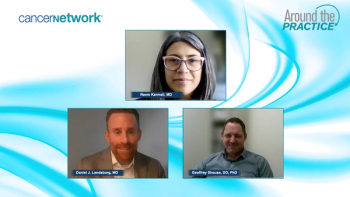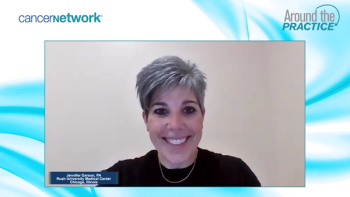Around the Practice: Patient-Centered Decision-Making in Relapsed/Refractory Follicular Lymphoma

Panelists discuss how recognizing disease heterogeneity and monitoring for clinical indicators of progression in relapsed/refractory follicular lymphoma (R/R FL) are essential for guiding timely and individualized third-line treatment decisions that optimize patient outcomes.

Panelists discuss how rebiopsy and CD20 reassessment at suspected progression of follicular lymphoma after second-line therapy are critical for detecting histologic transformation, evaluating changes in disease biology, and informing the selection of appropriate third-line treatment strategies.

Panelists discuss how treatment in the third-line setting for relapsed/refractory follicular lymphoma (R/R FL) should balance durable disease control with quality-of-life considerations, emphasizing the importance of shared decision-making to align clinical strategies with individual patient goals and preferences.

Panelists discuss how a thoughtful, individualized approach to third-line treatment in relapsed/refractory follicular lymphoma (R/R FL) involves assessing disease biology, prior treatment responses, and patient-specific factors to guide optimal therapy selection and align with patient-centered goals.

Panelists discuss how the updated NCCN Guidelines now recommend tazemetostat for the treatment of advanced epithelioid sarcoma, regardless of EZH2 mutation status, based on clinical trial data showing significant clinical benefits and improved progression-free survival in patients with both mutated and non-mutated disease.

Panelists discuss how evaluating zanubrutinib in combination with obinutuzumab involves considering patient comorbidities, disease characteristics, and previous treatments, with a focus on tolerability, adverse-effect profiles, and patient preferences to guide optimal treatment choices.

Panelists discuss how selecting CAR T therapies or bispecific antibodies for relapsed/refractory follicular lymphoma (R/R FL) depends on factors such as disease characteristics, prior treatment responses, performance status, CD20 expression, and overall patient health, emphasizing the importance of a personalized approach to treatment decisions.

Panelists discuss how shared decision-making in treatment selection involves considering factors such as treatment convenience, efficacy duration, toxicity profile, access to care, and financial impact, ensuring that the chosen approach aligns with the patient’s preferences, lifestyle, and overall well-being.

Panelists discuss how treatment sequencing for relapsed/refractory lymphoma is influenced by factors such as disease characteristics, prior treatments, patient preferences, and adverse effect profiles, with the inclusion of Tafasitamab + R2 in the second-line setting potentially altering third-line therapy decisions.

Panelists discuss how bridging therapies, including chemotherapy, targeted therapies, immunotherapy, and steroids, are used to control disease progression in patients awaiting CAR T therapy, with the choice of treatment depending on disease type, performance status, and the urgency of disease control.

Panelists discuss how collaborating with community physicians and providers through clear communication, shared care plans, education, referral networks, and regular monitoring is crucial for treating patients with complex cancer and ensuring coordinated care, particularly for those receiving advanced therapies such as CAR T and bispecific antibodies.

Panelists discuss how unmet needs in relapsed/refractory follicular lymphoma (R/R FL), including durability of responses, adverse effect management, personalized treatment, resistance to therapy, and access to care, are driving exciting developments in emerging targeted therapies, improved CAR T technologies, combination approaches, and efforts to enhance access and affordability for patients.

A panelist discusses how treatment decisions for relapsed/refractory follicular lymphoma (R/R FL) hinge on prior therapies, balancing goals between remission and disease control, while considering patient factors like age, access, and preferences among options such as CAR T-cell therapy, bispecific antibodies, and oral regimens.

A panelist discusses how advances in follicular lymphoma treatments have expanded options beyond third-line therapy, emphasizing individualized, multidisciplinary care that integrates medical, psychosocial, and logistical support to address the complex needs of often older patients managing an incurable disease.

A panelist discusses how tazemetostat offers a convenient, mutation-independent oral option for third-line follicular lymphoma treatment, balancing efficacy and tolerability while addressing patient lifestyle and financial considerations in an era of advanced therapies like CAR T-cell and bispecific antibodies.



